Coping with Communication Changes
On this page
Section one: Introduction and module aims
Introduction
Communication helps us to connect with others by sharing our thoughts, needs and feelings. It is a way for us to give information to others and for us to get information from them.
This can be:
- verbal (talking, listening)
- written (texts, emails, websites, books)
- visual (memes, photographs, charts)
- non-verbal (facial expression, gesture, tone of voice, body language).
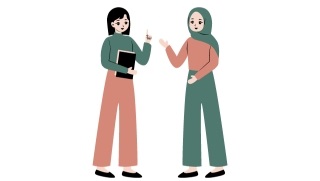
A brain injury can affect all forms of communication. This video has been made by people who have had a brain injury to help others understand how their brain injury has affected the way they communicate
Communication can change in different ways following a brain injury. Listen as people with brain injury explain how their communication has changed:
Aims of the module
This module will provide:
- information about how communication can change after a brain injury
- advice about how to manage communication changes in everyday life
- links to other helpful resources and support
Section two: Cognitive-communication difficulties
Introduction
In this section we will explain:
- the meaning of the term ‘cognitive-communication difficulties’
- how following conversations can be affected and ways to help you
- how talking during conversations can be affected and ways to help you
- how social life can be affected and ways to help you
- how reading and writing can be affected and ways to help you
What are cognitive-communication difficulties?
Cognitive-communication difficulties are the most common type of communication change after a brain injury. More than 75% of people who have a moderate to severe head injury are affected in this way. (MacDonald, 2017).
Being able to communicate well involves many aspects of thinking and social skills e.g., concentration, memory, being flexible, problem solving and understanding the thoughts and feelings of other people.

Changes to thinking skills following brain injury will also affect a person’s communication.
This makes it harder for them to have conversations, have good relationships, and to read and write.
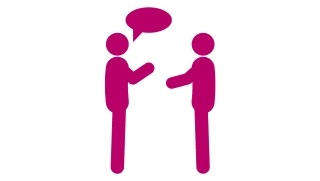
Listen as people with lived experience of brain injury explain why it is difficult to follow conversations and what helps:
How taking part in conversations can change following a brain injury
Following Conversations:
Changes to your thinking skills can make it harder to concentrate on conversations. These changes can also make it hard to follow and remember conversations.
This is most difficult when:
- A lot of information is given at one time
- The conversation is very fast
- More than two people are taking part in the conversation
- The environment is busy or noisy e.g. supermarket, party
- The conversation is online or over the phone
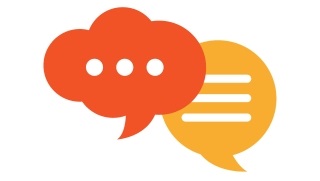
This can result in you:
- Feeling overwhelmed or anxious
- Becoming distracted and losing the thread of the conversation
- Forgetting or ‘misremembering’ what has been said.
- Feeling exhausted and drained
These changes are very common following brain injury and you are not alone.

There are some strategies that you can use to help.
Video of strategies to help you to follow conversations following brain injury:
Talking during Conversations:
Changes to your thinking skills can also make it more difficult to say what your want to say in conversations.
You mind find it hard to:
- Think of topics to talk about
- Plan and organise what to say
- Find the right words
- Stay on track during the conversation
- Remember what its ok to say and what you should keep private.

You might not see these changes yourself but you might have been told by others that:
- You say too much
- You don’t say enough
- You repeat yourself
- You say things that are rude or insensitive
- You do not consider what the other person is thinking and feeling
These changes are very common following brain injury and you are not alone.

Listen as someone following brain injury explains what it is like to have social communication changes:
There are some strategies that you can use to help.
Video of strategies to help you to express yourself following brain injury:
Reading and writing after brain injury:
Changes to your thinking skills and language skills can affect the way you read and write after brain injury.
This means it might be difficult to:
- Read or write text
- Understand what you have read
- Follow longer and more complicated written information
- Remember what you have read or written

Strategies to help you read:
- Highlight the key words as you read – you could do this with a highlighter pen or underline them
- Focus only on the key information points (think about who/when/where)
- Some electronic devices will read out your texts and emails- see the resources section for more information about this
- Write down the key points in your diary or calendar
- Recording Pens scan a line of text and read it to you.
- Audiobooks are books that you can listen to. Many audiobooks allow you to control the speed they are played.
Writing can also be affected by brain injury.
Just like with talking, you might find it difficult to think of what to write, find the right words and remember how to spell them.
The following strategies may help:
- Have someone help you make a template for cards, letters and texts. You can use this to fill in words to make messages personal to the person you are writing to.
- Use the predictor text/ spell check on your electronic device to help with spelling
- Some apps and devices translate speech into written words. Please see the resources section for examples of this.

Socialising after a brain injury:
It can be more difficult to socialise with others following a brain injury.
You might also find you don’t know how to build relationships and keep them.
This can mean you feel lonely and have fewer people in your social circle over time.
This is very common following brain injury and you are not alone.

The challenges of communicating with friends and keeping friendships going following brain injury
Listen as people with brain injury explain how their social circle and friendships have changed:
There are some strategies and services available which can help you to make contact with others once again.
Video of strategies to help you to connect with others following brain injury:
Please have a look at the resources section at the end of this module for links to other helpful resources and further support.
Section three: Changes to language abilities following brain injury- aphasia
Introduction
In this section we will explain:
- the meaning of ‘aphasia’
- how aphasia can affect you and strategies to help
- how other people can help
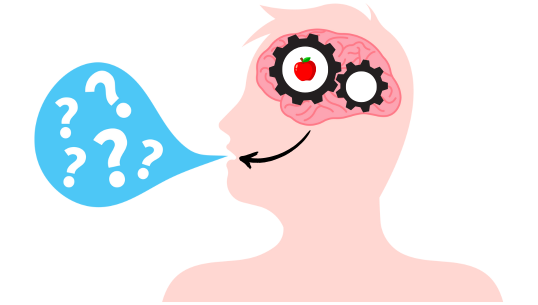
What is Aphasia?
Aphasia is when a person has difficulty with their language. It’s caused by damage to the parts of the brain that control language. Aphasia is a long-term, life-changing condition. It can affect your ability to:
- Understand words and sentences in conversations
- Find the right words, make sentences and say what you are thinking when talking
- Understand the information that you are reading
- Write down words and sentences
This video from The Stroke Association is an introduction to aphasia:
Aphasia can make it difficult for someone to show what knowledge, skills and abilities they still have.
Other people can wrongly think the person with aphasia isn’t able to make decisions or contribute to the conversation.
This can cause the person with aphasia to feel frustrated and lonely.

How aphasia might affect me?
Having difficulty understanding and/or using language can have an effect on your confidence. It can also make it difficult for you to carry out many everyday activities.
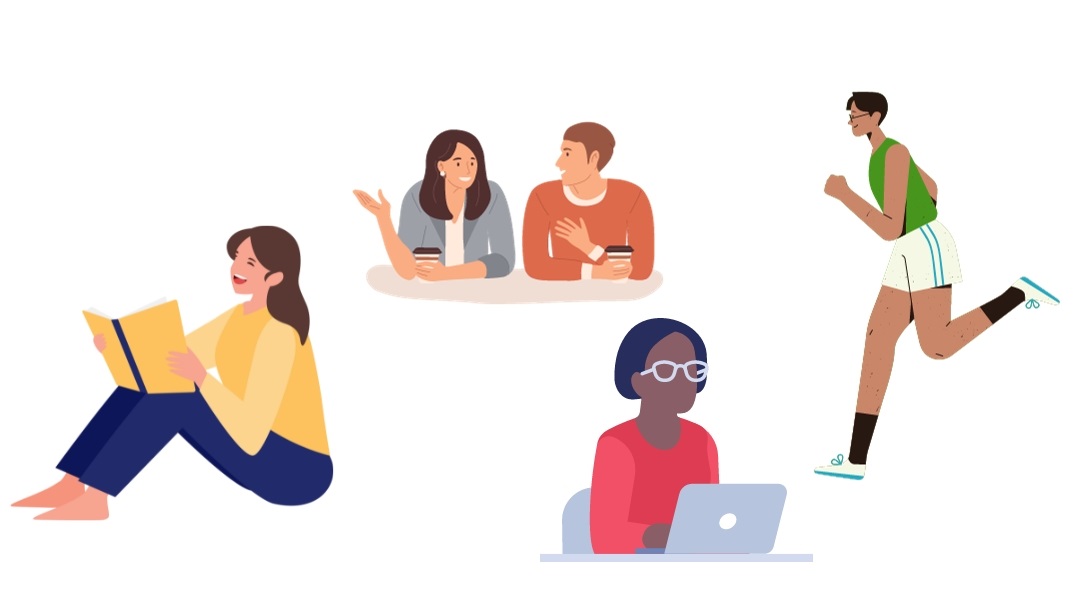
You might find it hard to:
- watch television or listen to the radio
- talk or text on the phone
- read magazines, news articles or social media posts
- write birthday cards, shopping lists or a diary
- use a computer
- have conversations
What can I do to help myself?
You might find that changes to your language following your brain injury can make you feel frustrated, tired, and upset when you’re talking to people. You might find the following tips can help you.
- Turn off the TV or Radio when you are talking to people. These can be distracting.
- Take your time! Don’t feel like you need to rush.
- It is okay ask others to slow down and repeat what they have just said

To help you get your message across:
- Take a look at the resource page at the end of this module for links to helpful resources and support
- Use gestures, hand movements, drawing and writing as well as talking
- Use photos and objects to show what you mean
- If you cannot think of a word, describe it
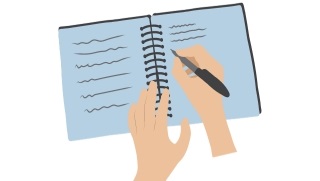
What is it used for?
Where would you find it?
What does it look like?
colour, shape, size …

I want to help someone who has aphasia, what can I do?
Do:
- Find a quiet place to talk
- Switch of any distractions
- Keep it short, simple but adult
- Slow down your speech
- Write single words and use pictures or gestures to aid understanding
- Give lots of time
- Look at the facial expressions and gestures the person uses
- Pick up on key words and gestures
- Encourage the person to draw, write or point
- Ask yes and no questions
Do Not:
- Talk louder, unless asked to
- “Talk down” to the person
- Finish sentences
- Ask questions that require long, detailed answers
- Pretend you understand
Section four: Changes to speech following brain injury- dysarthria
Introduction
In this section we will explain:
- the meaning of ‘dysarthria’
- how speech can be affected and strategies to help
- how other people can help
What is dysarthria?
Dysarthria changes how clearly a person speaks as the muscles we need for speech don’t move as well. Slurred speech doesn’t affect our understanding or our intelligence.
Sometimes other people think a person with slurred speech has been drinking alcohol, or has a developmental disability.
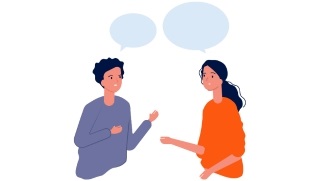
How might this affect me?
It might be hard to speak clearly even though you know what you want to say
We use lots of muscles in our mouth, throat and chest to talk.
If these muscles can’t move in the way they usually do, we might:
- Sound like we’re slurring our words
- Run out of breath when talking
- Run out of muscle strength and become tired
- Struggle to change tone of voice
- Sound like we’re talking through our nose
- Struggle to control how fast we talk- might be too fast or slow
- Struggle to control how loud we talk-might be too quiet or loud

What can I do to help myself? (Strategies)
Changes to your speech following brain injury can make you feel frustrated, tired, and upset when you’re talking to people. There are some strategies you can use to help your speech sound clearer and make it easier for you to have conversations.
Video of strategies to help your speech sound clearer:
Remembering to use all of these strategies at once can be tricky. Choosing one or two to focus on at a time can be easier.
I want to help someone who has dysarthria, what can I do?
It can be difficult to know how to help someone who is struggling to get their words out clearly. Here are some useful hints and tips;
Video of strategies to support someone who has dysarthria:
Reference: MacDonald, S. Introducing the model of cognitive-communication competence: A model to guide evidence-based communication interventions after brain injury. Brain Injury, 2017;31(13-14):1760-1780
Resources
Helpful resources for cognitive-communication difficulties
Things to read:
- Headway factsheet on cognitive-communication difficulties
- Tactus Therapy- what is cognitive-communication disorder?
Resources:
- The social-ABI-lity course- a course to help you use social media safely and well – https://abi-communication-lab.sydney.edu.au/courses/social-abi-lity/
- I’d like my family and friends to learn how to communicate with me- signpost them to https://abi-communication-lab.sydney.edu.au/courses/interact-ABI-lity/
- Brain injury card to show others- www.headway.org.uk/supporting-you/brain-injury-identity-card
Helpful resources for reading and writing
Therapy apps to help with reading and writing skills:
(All of the Tactus Therapy apps are designed by a certified speech and language therapist and are based on research and clinical best practices).
Apps and device aids that translate the written word into speech to help with reading and the spoken word into written form to help with writing:
- Siri, Google assistant, Project Relate
- Microsoft windows has ease of access options such as magnifier, narrator, on screen keyboard and speech recognition.
Helpful resources for aphasia
Things to read:
- What is Aphasia (Aphasia-Friendly) – Aphasia Institute
- https://www.chss.org.uk/living-well/communication-difficulties/#0
- What Is Aphasia? — Types, Causes and Treatment (nih.gov)
Resources:
Understanding aphasia, treating aphasia and self-management therapy apps
(All of the Tactus Therapy apps are designed by a certified speech and language therapist and are based on research and clinical best practices).
Helpful resources for dysarthria
Things to read:
Resources:
Understanding dysarthria, how to treat dysarthria and self-management therapy apps
(All of the Tactus Therapy apps are designed by a certified speech and language therapist and are based on research and clinical best practices).
Apps to support your speech:
- Information about android apps https://www.callscotland.org.uk/downloads/posters-and-leaflets/android-apps-for-complex-communication-support-needs/
- Information about Apple apps: https://www.callscotland.org.uk/downloads/posters-and-leaflets/ipad-apps-for-complex-communication-support-needs/
Free apps to support your speech:
- Speech Assistant AAC, Speech Helper, AAC Bestie
Communication access
- Free training to make our community accessible and for people with communication difficulties: https://communication-access.co.uk/

